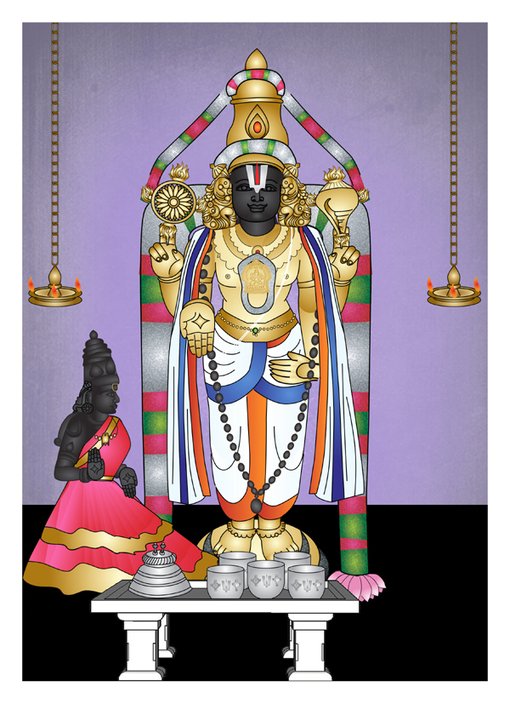80
Srivaikuntam
ஸ்ரீவைகுண்டம் (நவதிருப்பதி)

Navathiruppathi
ஸ்ரீ வைகுந்தவல்லீ ஸமேத ஸ்ரீ கள்ளப்பிரான் ஸ்வாமிநே நமஹ
Historical Significance:
The Brahmanda Purana mentions this sacred site. During a time when the world was submerged in water due to a pralaya (great deluge) in the Satya Loka, where Brahma resides, a demon named Somukasura stole a secret book on the art of creation (Srishti Ragasyam) kept by Lord Brahma.
Realizing his predicament, Brahma decided
பிரம்மாண்ட புராணத்தில் இத்தலத்தைப் பற்றிச் சொல்லப்படுகிறது. பிரம்மன் எழுந்தருளியுள்ள சத்திய லோகத்தில் ஒரு சமயம் பிரளயம் ஏற்பட்டு எங்கும் நீர் சூழ்ந்து கொண்டிருந்த காலத்தில் சோமுகாசுரன் என்ற அரக்கன் பிரம்மதேவன் வைத்திருந்த (ச்ருஷ்டி ரகஸ்யக் கிரந்தம்) படைப்புத்தொழில் + Read more
Recitation
TVM 9.2.4
வைகுந்தத்துள்நின்று *
தெளிந்தவென்சிந்தையகங்கழியாதே
என்னையாள்வாய்! எனக்கருளி *
நளிந்தசீருலகமூன்றுடன்வியப்ப
நாங்கள்கூத்தாடிநின்றார்ப்ப *
பளிங்குநீர்முகிலின்பவளம்போல்
கனிவாய்சிவப்ப நீகாணவாராயே.
இருந்து * வைகுந்தத்துள் நின்று *
தெளிந்த என் சிந்தையகம் கழியாதே *
என்னை ஆள்வாய் எனக்கு அருளி **
நளிர்ந்த சீர் உலகம் மூன்றுடன் வியப்ப *
நாங்கள் கூத்து ஆடி நின்று ஆர்ப்ப *
பளிங்கு நீர் முகிலின் பவளம் போல் * கனிவாய்
சிவப்ப நீ காண வாராயே (4)
iruntu * vaikuntattul̤ niṉṟu *
tĕl̤inta ĕṉ cintaiyakam kazhiyāte *
ĕṉṉai āl̤vāy ĕṉakku arul̤i **
nal̤irnta cīr ulakam mūṉṟuṭaṉ viyappa *
nāṅkal̤ kūttu āṭi niṉṟu ārppa *
pal̤iṅku nīr mukiliṉ paval̤am pol * kaṉivāy
civappa nī kāṇa vārāye (4)
Ragam
Thalam
Bhavam
Divya Desam
Simple Translation
Explanatory Notes
(i) In His iconic manifestation, the Lord assumes different postures; in certain pilgrim centres, He reposes, in some, He is seen seated, while, in others, He keeps standing. These can be adored individually as well as collectively, as in this song. As Saint Nammāḻvār contemplated on the manifestations of the Lord, in His worshippable Forms, at the various pilgrim centres,
Word by Word (WBW) meaning
(The words may be rearranged to facilitate conversion from poetry to prose (Aṉvayam). Please read the meanings (in black) continuously to form the sentence and understand the simplified meaning based on the Divyārtha Dīpikai for the verse.)
TVM 9.2.8
இணையடிதொழுதெழுந்திறைஞ்சி *
தங்களன்பாரத்தமதுசொல்வலத்தால்
தலைத்தலைச்சிறந்தபூசிப்ப *
திங்கள்சேர்மாடத்திருப்புளிங்குடியாய்!
திருவைகுந்தத்துள்ளாய்! தேவா! *
இங்கண்மாஞாலத்திதனுளுமொருநாள்
இருந்திடாய் வீற்றிடங்கொண்டே.
இணை அடி தொழுது எழுது இறைஞ்சி *
தங்கள் அன்பு ஆர தமது சொல் வலத்தால் *
தலைத்தலைச் சிறந்து பூசிப்ப **
திங்கள் சேர் மாடத் திருப்புளிங்குடியாய் *
திரு வைகுந்தத்துள்ளாய்! தேவா *
இங்கண் மா ஞாலத்து இதனுளும் ஒருநாள் *
இருந்திடாய் வீற்று இடம் கொண்டே (8)
iṇai aṭi tŏzhutu ĕzhutu iṟaiñci *
taṅkal̤ aṉpu āra tamatu cŏl valattāl *
talaittalaic ciṟantu pūcippa **
tiṅkal̤ cer māṭat tiruppul̤iṅkuṭiyāy *
tiru vaikuntattul̤l̤āy! tevā *
iṅkaṇ mā ñālattu itaṉul̤um ŏrunāl̤ *
iruntiṭāy vīṟṟu iṭam kŏṇṭe (8)
Ragam
Thalam
Bhavam
Divya Desam
Simple Translation
Explanatory Notes
(i) The Lord is known to remain seated in the Durbar hall in the high spiritual worlds, where He grants audience. The
Āzhvār would, however, pray unto the Lord, reclining in Tiruppuḷiṅkuṭi, to appear like-wise, right here, so as to attract the people over here and make them worship Him, to their heart’s fill, in grateful appreciation of His great gesture.
(ii)